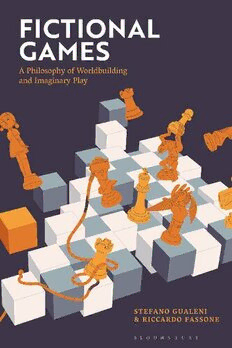Download Fictional Games: A Philosophy of Worldbuilding and Imaginary Play PDF Free - Full Version
Download Fictional Games: A Philosophy of Worldbuilding and Imaginary Play by Stefano Gualeni; Riccardo Fassone in PDF format completely FREE. No registration required, no payment needed. Get instant access to this valuable resource on PDFdrive.to!
About Fictional Games: A Philosophy of Worldbuilding and Imaginary Play
What role do imaginary games have in story-telling? Why do fiction authors outline the rules of a game that the reader will never watch or play? Combining perspectives from philosophy, literature and game studies, this book provides the first in-depth investigation into the significance of games in fictional worlds.With examples from contemporary cinema and literature, from The Hunger Games to the science fiction of Iain M. Banks, Stefano Gualeni and Riccardo Fassone introduce four key functions that different types of imaginary games have in worldbuilding. First, fictional games can emphasize the dominant values and ideologies of the fictional society they belong to. Second, some games function as critical, utopian tools, inspiring shifts in the thinking and political orientation of the fictional characters. Third, imaginary games, especially those with a magical component, are conducive to the transcendence of a particular form of being, such as the overcoming of human corporeality. And fourth, fictional games can deceptively blur the boundaries between the contingency of play and the irrevocable seriousness of “real life”, either camouflaging life as a game or disguising a game as something with more permanent consequences.With illustrations in every chapter, bringing the imaginary games to life, Gualeni and Fassone creatively inspire us to consider fictional games anew: not as moments of playful reprieve in a storyline, but as significant and multi-layered rhetorical devices.
Detailed Information
| Author: | Stefano Gualeni; Riccardo Fassone |
|---|---|
| Publication Year: | 2022 |
| ISBN: | 9781350277090 |
| Pages: | 217 |
| Language: | English |
| File Size: | 34.31 |
| Format: | |
| Price: | FREE |
Safe & Secure Download - No registration required
Why Choose PDFdrive for Your Free Fictional Games: A Philosophy of Worldbuilding and Imaginary Play Download?
- 100% Free: No hidden fees or subscriptions required for one book every day.
- No Registration: Immediate access is available without creating accounts for one book every day.
- Safe and Secure: Clean downloads without malware or viruses
- Multiple Formats: PDF, MOBI, Mpub,... optimized for all devices
- Educational Resource: Supporting knowledge sharing and learning
Frequently Asked Questions
Is it really free to download Fictional Games: A Philosophy of Worldbuilding and Imaginary Play PDF?
Yes, on https://PDFdrive.to you can download Fictional Games: A Philosophy of Worldbuilding and Imaginary Play by Stefano Gualeni; Riccardo Fassone completely free. We don't require any payment, subscription, or registration to access this PDF file. For 3 books every day.
How can I read Fictional Games: A Philosophy of Worldbuilding and Imaginary Play on my mobile device?
After downloading Fictional Games: A Philosophy of Worldbuilding and Imaginary Play PDF, you can open it with any PDF reader app on your phone or tablet. We recommend using Adobe Acrobat Reader, Apple Books, or Google Play Books for the best reading experience.
Is this the full version of Fictional Games: A Philosophy of Worldbuilding and Imaginary Play?
Yes, this is the complete PDF version of Fictional Games: A Philosophy of Worldbuilding and Imaginary Play by Stefano Gualeni; Riccardo Fassone. You will be able to read the entire content as in the printed version without missing any pages.
Is it legal to download Fictional Games: A Philosophy of Worldbuilding and Imaginary Play PDF for free?
https://PDFdrive.to provides links to free educational resources available online. We do not store any files on our servers. Please be aware of copyright laws in your country before downloading.
The materials shared are intended for research, educational, and personal use in accordance with fair use principles.

